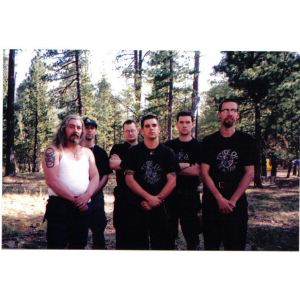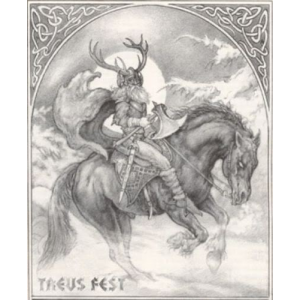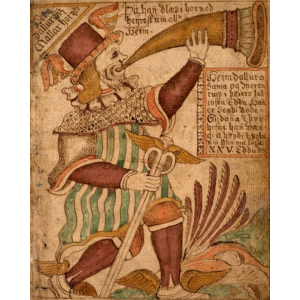 The old norse word "Gothar" is the plural form of Gothi or Gythia. The Gothar are the collective priesthood of the Asatru Community. Proper pronunciation in Old Norse is: Gothar (go-thar). It literally means: those who speak the godly tongue.
The old norse word "Gothar" is the plural form of Gothi or Gythia. The Gothar are the collective priesthood of the Asatru Community. Proper pronunciation in Old Norse is: Gothar (go-thar). It literally means: those who speak the godly tongue.
We know from many surviving ancient accounts that the Gothar played a pivotal role in the founding of Iceland and the development there of a system of government known as the Godic Republic. This ancient method of self government was known as the AlThing. At the AlThing the Gothar of the 36 districts of Iceland met annually to read the Law, settle disputes among the Folk, and mete justice to law breakers.
This concept of self rule has been practiced since antiquity by the people of the North. We will deal in greater detail in a future article titled "The AlThing", but here we will discuss the role of the Gothar in the contemporary Asatru Community.
In ancient times, as we know from the writings of Tacitus in The Agricola and The Germania, the Teutons worshipped their Gods and goddesses in holy groves and by sacred springs and rivers. Tribal priests and priestesses presided in these matters. We learn from Adam of Bremen of the great Temple of Uppsala, where great public Blots were held, again presided over by the Temple Priests. There are also numerous Saga accounts of the Hofs maintained by the priests for public worship in Norway and Iceland.
From all of this we learn that there were people who specialized in conducting public worship of the Gods and Goddesses. They were also responsible for establishing Hofs and Temples, and maintained the equipment and furnishings necessary to conduct Blots and other religious services. In the days of the Godic Republic, the Gothar was also responsible for the civil administration of the country as well.
In modern times, as the Asatru Community struggles to reassert itself as the true religion of the Folk, the work of the Gothar is difficult indeed. Not only is it his or her duty to conduct the Blots, maintain the Hofs and sacred groves and provide the ritual equipment, but he or she must also seek out those within our Folk worthy to practice the old ways, and to reawaken the Ancestral Soul of our people, which is weak and near death after a thousand years of Christian pollution.
The true Gothar of the modern era must be a fearless spiritual warrior, a fervent Asatru missionary. They must be as wise as the AllFather, as strong as Asa Thorr, and as loving as the Lady Freya, if they are to succeed in their chosen profession. In short, only the bravest, wisest, and most loving of our Folk can ever aspire to the position of Gothi or Gythia. Nothing less than total dedication and personal sacrifice to our cause will do. Anything less will result in failure. If you are a dabbler in the Northern mysteries, a crystal poking Norse Wiccan, or someone who lives in a fantasy world, please go far away and do everyone a favor. For the rest of you who have a sincere desire, a burning will, and a constitution of iron, we will proceed. In Vor Tru No. 52 not only did we discuss the significance of the Blot, we examined the actual mechanics for performing public sacrifice, and we discussed also the part that the Gothi and Gythia played in such religious services of the Folk. I urged all who have the desire to perform Blots to do so whether privately at home with the family, or publicly in the sacred places with the Kindred. The person who performs the Blot, is at that place and time a Gothi. However, it is what you do for the Folk after the Blot which determines whether you are indeed a member of the Gothar, one who has earned the respect of the Asatru Community as a tireless and fearless spiritual leader of the Folk, and one who constantly strives to improve himself through constant study and practice of the lore of our people. Indeed, are you one who has earned the respect and admiration of the Folk because of your tireless efforts in their behalf?
At this point, let's assume that you aspire to become one of the Gothar. Where do you begin? I will start by saying that I have known more than a few who wished to become a Gothi. My best advice at this time is to urge them to find a recognized Gothi, and somehow convince the Priest of the Folk to become his apprentice. You must realize at this point in time that many may choose to walk this path, but by the process of natural selection, few will attain their goal. If you find a Gothi to aid you in your studies, you are fortunate to have that aid in your quest. If you personally don't know anyone of the Gothar, don't despair. You can teach yourself. THEY DID!
Free eBooks (Can Be Downloaded):
Stephen Flowers - The Secret Of The Gothick God Of DarknessJantina Helena Looijenga - Runes Around The North Sea And On The Continent
Michal Jerabek - The Book Of Enoch Vol Iii The Asatronomical Book

